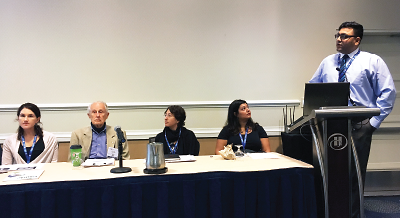Refugees, no matter where they’re from or how old they are or what drove them from their homes, have experienced stresses serious enough to threaten their mental well-being, said speakers at APA’s fall meeting, IPS: The Mental Health Services Conference, held in Washington, D.C., in October.
All face a higher risk of depression, anxiety, PTSD, and other reactions to their experiences, even once they have migrated to relative safety, noted session organizer Amy Gajaria, M.D., a PGY-4 at the University of Toronto.
Children are an especially high-risk group, said Gaurav Mishra, M.D., M.B.B.S., a child psychiatrist with the Imperial County (Calif.) Behavioral Health Services, near the border with Mexico. He sees young people who come from Nicaragua, Honduras, and El Salvador, as well as surprising numbers from Haiti and Africa. Many faced violence back home, separation from their parents, and exploitation or abuse on the way to the United States, said Mishra. In addition, young children’s reactions may be heightened by the fact that they have little say in the decision to emigrate.
Imperial County provides age-graded services for children, adolescents, and young people up to age 25 who have behavioral problems or diagnosed mental illnesses. For instance, the Vista Sands Program addresses behavioral issues among 7- to 12-year-olds by giving them half a day in school and half a day of group work on social skills, anger management, and self-control. Funding comes from California’s 1 percent tax on incomes over $1 million.
“I also see my role as an educator to others, particularly to the rest of the medical community in the area,” said Mishra.
Another subpopulation more vulnerable than most to the effects of forced migration is the elderly, said Peter Ureste, M.D., a geriatric psychiatry fellow at the University of California, San Francisco, and an APA Public Psychiatry Fellow.
“They may face malnutrition when food is rationed after a disaster,” said Ureste, “and their physical limitations may hamper navigating makeshift shelters or reaching dropoff points for food and water. Plus, it’s hard for those with chronic illnesses to stay on medications.”
Older people have longstanding attachments to their homelands and so may experience grief, depression, or anxiety when forced to leave, he said. However, older people can also serve as carriers of cultural traditions to shore up communities and, on a practical level, care for children and the sick while younger people work or rebuild.
“Refugees from Syria are all affected by loss of home, money, jobs, family, and friends,” said Ashley Nemiro, Ph.D., the technical advisor for mental health for the International Rescue Committee (IRC), which helps refugees resettle in the United States. “They experience stress from the conflicts in their home country, from their displacement, and from daily life in the places where they have resettled. They face a unique set of psychosocial needs and have a high level of severe emotional disorders.”
Coming from a war zone, all have lost friends or family members and have relatives still back in Syria about whom they worry. They often don’t know what to expect when they arrive in the United States and may even face hostility.
Curiously, refugees from rural areas sometimes cope better than middle-class professionals, she said. The latter may have academic credentials that aren’t valid in this country and have had steeper losses of identity, status, and income.
IRC uses the Refugee Health Screen (RHS-15) to screen clients for anxiety, depression, and PTSD and then determine their placement and track their progress. Also, all female refugees are screened for domestic violence and sexual assault—with a 25 percent positive rate so far.
The organization has developed a variety of support systems for refugees by creating partnerships and integrating services with existing community programs. In Baltimore, for instance, community health workers visit the refugees to connect them with community services; in Dallas they connect with clients through a local mosque; and in Phoenix, they use high school and adult group therapy.
“It’s difficult in practice,” said Nemiro. “We need to let people tell us their stories and then help them to do the tasks of daily living themselves.”
It may be difficult for those who serve them as well, said Steven Moffic, M.D., the discussant at the session and a retired professor of psychiatry and behavioral medicine at the Medical College of Wisconsin.
“Working with these populations can be a route to burnout,” said Moffic. “It’s important how organizations deal with that possibility and provide support for their mental health professionals.” ■

